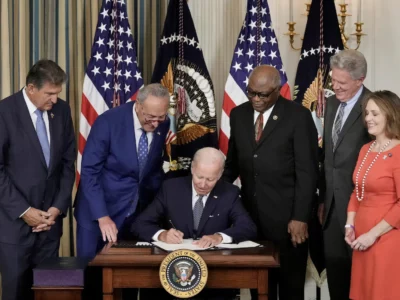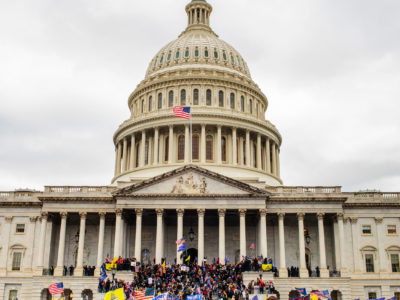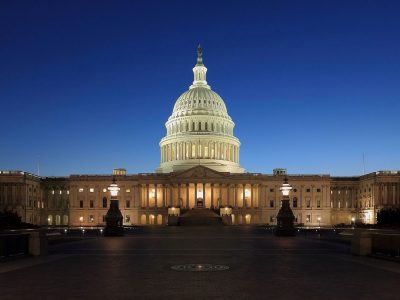2024 elections
2024: Ending on a Dark Note
It was a pretty good year for the environment – until November 5, that is.
2024 ended on a grim note for anyone who cares about the environment. Donald Trump is once again in the White House. His record in the first term made him in the most anti-environmental President in history. The story of the next four years will be a struggle to limit his damage while doing as much as we can to continue progress at the state level and in the private sector.
CONTINUE READINGClimate Politics and Electoral Realignment
Some deep-seated dividing lines in U.S. politics seem to be eroding, with potential implications for climate policy.
The electorate is changing. Racial divisions are blurring, the GOP has gained a solid following among working class voters (especially whites), and college graduates and those with above median incomes have shifted to the Democrats. Among the many effects will be changes in the politics surrounding climate change. We will start to see an increased rate of success for advocates of climate actions in off-year and down-ballot races.
CONTINUE READINGCarrots Are More Durable Than Sticks
Laws like the Inflation Reduction Act may have more sticking power than regulations.
it’s hard to repeal subsidies and tax credits. We’re seeing that right now in Congress. There’s been a lot of talk by Trump and others of blowing away the IRA. But many billions of dollars of IRA investments are being made in Republican congressional districts. And this has had an effect. Subsidies won’t solve the climate crisis on their own, but they provide a solid economic and political foundation for climate policies of all kinds.
CONTINUE READINGClimate, Energy, and Environment on the Ballot
Ballot measures in Washington and California are especially important but others are worth noting.
The two biggest state initiatives are a $10 billion green bond proposal in California and a proposed rollback of Washington State’s new cap-and-trade program. The outcomes of these and other initiatives will provide a barometer of public sentiment on environmental issues.
CONTINUE READINGWith 4 Weeks Left, the Election – and the Future of Climate Policy – Hang in the Balance
The White House and control of the House remain toss-ups.
Yhe outcome of the 2024 election will be pivotal for climate and energy policy. With a month to go, things are still incredibly close. Harris has a tiny edge in the electoral college and the Republicans have similar edges in the House and Senate.So hang onto your hats for the final stretch of this rollercoaster ride. A last-minute “October surprise” is still possible, and it’s also possible that polls will turn out wrong.
CONTINUE READINGThe Two Races Most Likely to Determine Control of the Senate
The outcomes will shape environmental policy in the new Congress.
To keep control of the Senate, Democrats must hold on to the White House and two Senate seats in red states. If Republicans win in Ohio or Montana, they are virtually guaranteed to flip the Senate, with important consequences for environmental policy.
CONTINUE READINGClimate Politics and Policy in Nebraska
In a divided nation, could the Cornhusker State turn out to hold the balance of power?
In what has turned out to be an interesting Senate race, Republican incumbent Deb Fischer is facing Independent Dan Osborn (I). Fischer has a lifetime score of 8% from the League of Conservation voters and hates EVs. Osborn seem pro-renewables. The outcome could determine control of the U.S. Senate.
CONTINUE READINGThe Battle for Congress: Key U.S. House Races in California
These elections could prove critically important to how much the next President can reshape energy and environmental policy.
These are key races for control of the House: if they did all flip and Democrats held their remaining seats, Hakeem Jeffries would be the next Speaker. The battle for control of the U.S. House is going to be very tight. Democrats need to pick up only four seats to flip control – something that will be especially important for them if Trump wins and Republicans win the Senate as expected. Especially in that scenario, control of the House will have a big impact on climate and energy policy, one way or the other. It doesn’t look like climate or energy are major issues in the key U.S. House races in California. Only one candidate (Dave Min) devotes significant attention to them. To avoid unintentionally distorting anyone’s views, these descriptions are taken straight from their campaign websites.
CONTINUE READINGThe State of the Race
Who will shape federal climate and energy policies? The answer remains too close to call.
Republicans are favored to take control of the Senate, but who will control the House and the Presidency remains too close to call. The implications for climate policy and the future of the planet could be profound.
CONTINUE READINGWhy the 2024 House Races Matter So Much for Energy and Climate Policy
Those races get a lot less attention than elections for the Senate, but they’re equally important.
Unified government would give Trump a much freer hand. Republicans are likely to win the Senate. If they also win the House, he wouldn’t have to worry about annoying congressional investigations and could use the Senate reconciliation procedure to gut environmental agencies and federal support for clean energy.
CONTINUE READING










